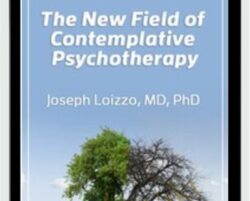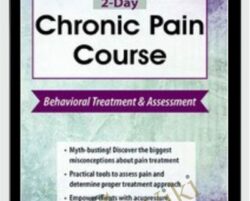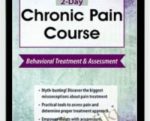Another client enters your office angry about the chronic pain they struggle with daily. They start sharing their story and the mask of frustration peels away to reveal the hopelessness and despair from living in a constant state of misery. Most clinicians are not trained in chronic pain, yet this scenario is becoming all too familiar, as at least 1/3 of our clients suffer from chronic pain. More and more clients are moving away from medication, seeking out holistic solutions, yet we’re not quite sure of the best way to help them.Imagine helping your clients learn that while pain might be unavoidable, misery is optional. Strengthen the therapeutic relationship by validating the reality of clients’ pain while introducing ways to help them immediately experience a lessening of their distress. Explore acupressure and meditation to help clients discover how mind and body are connected.In this recording, neuropsychologist, Dr. Robert Rosenbaum, will teach you the facts about pains’ biology and effective treatment strategies, so you can confidently educate and treat your clients. With experiential exercises such as guided imagery, acupressure, meditation, and gentle movement, combined with cognitive-behavioral methods, you’ll leave with the right skills and tools at your fingertips to treat chronic pain.Explore strategies on how to prevent pain before it begins for purposes of client psychoeducation.Explain the importance of early intervention in the pain cycle and its clinical implications.Identify the most common pain complaints as related to clinical treatment.Describe how age, gender, ethnicity, and culture influence the experience of pain as it relates to case conceptualization.Distinguish how different types of pain require different treatment approaches.Correlate how the brain, the mind, and the heart all affect pain for purposes of client psychoeducation.Examine and counter maladaptive myths about pain to improve client level of functioning.Assess pain through specialized questionnaires and interview methods to inform the clinician’s choice of treatment interventions.Demonstrate four meditation methods useful for dealing with pain in session.Discover six acupressure points helpful for pain prevention and management in clients.Implement clinical methods to help clients concretize their pain and use guided imagery to alleviate pain.Identify existential, spiritual, and self-identity issues which interact with biological and psychological components of pain as it relates to treatment outcomes.Get 2-Day Chronic Pain Course: Behavioral Treatment and Assessment – Robert Rosenbaum, Only Price $175Impact of Chronic Pain on Mental HealthPrimary PreventionThe best treatment is preventionEarly detection and early interventionPain Prevalence and ImpactIncidence and prevalence: most common typesSocietal costsImpact on client mental health and quality of lifeSociodemographic factorsThe Biology of PainWhat is pain?Physical, emotional, psychological, and environmental factorsPain intensity vs pain distressTypes of PainNociceptive and neuropathicEffect of locationEtiology, temporal course, sensationInflammation, cancer, IschemicAcute vs chronic painPain transmission and modulationNeurochemicals of painPain, Brain, StrainCentral sensitizationThe role of attentionPain: Beyond Basic BiologyBiopsychosocial modelVicious circles of maladaptive coping strategiesPsychological and emotional aspects of painPain’s effect on the sense of selfCountering pain mythsAssessment, Interventions, and ManagementPain Treatment OptionsMedications and medical proceduresIntroduction to analgesicsOpioids – Myths and FactsThe opioid epidemicOpioid efficacy, risksTolerance vs. addictionRisk of addiction and abuseAssessmentBasic guidelinesThe interviewPsychometric instrumentsPain vs. distressBehavioral TreatmentTechnique vs. relationshipMindfulness and other meditationsThe hype and the realityFocuses and open awarenessBreathing techniques: four methodsComfort strategies: You Are Bigger than the PainAwarenessImportance of early detectionConcretizing with imagery and namesRe-FocusWidening and narrowing attentionGoing distal; going to the centerImagery and self-hypnosisRe-thinkingCBT for catastrophizingSeparate pain from distressDeal with flaresAdditional behavioral treatment toolsPacingGentle movementThe importance of face, hands, feetAcupressure self-massageQigong for painSleep and restEnjoyCultivating positivesAntidotes for difficult emotionsIncreasing emotional granularityRelateFoster positive relationshipsDeal with difficult relationshipsDifferential treatment considerationsOutcomes of integrative interventionsResearch limitations and risks of psychotherapeutic approachesGet 2-Day Chronic Pain Course: Behavioral Treatment and Assessment – Robert Rosenbaum, Only Price $175Tag: 2-Day Chronic Pain Course: Behavioral Treatment and Assessment – Robert Rosenbaum Review. 2-Day Chronic Pain Course: Behavioral Treatment and Assessment – Robert Rosenbaum download. 2-Day Chronic Pain Course: Behavioral Treatment and Assessment – Robert Rosenbaum discount.
 The New Field of Contemplative Psychotherapy – Joseph Loizzo
₹7,138.00
The New Field of Contemplative Psychotherapy – Joseph Loizzo
₹7,138.00
 The Real Deal Video Strategist Club – Mark Cloutier
₹13,778.00
The Real Deal Video Strategist Club – Mark Cloutier
₹13,778.00
2-Day Chronic Pain Course: Behavioral Treatment and Assessment – Robert Rosenbaum
₹28,386.00



